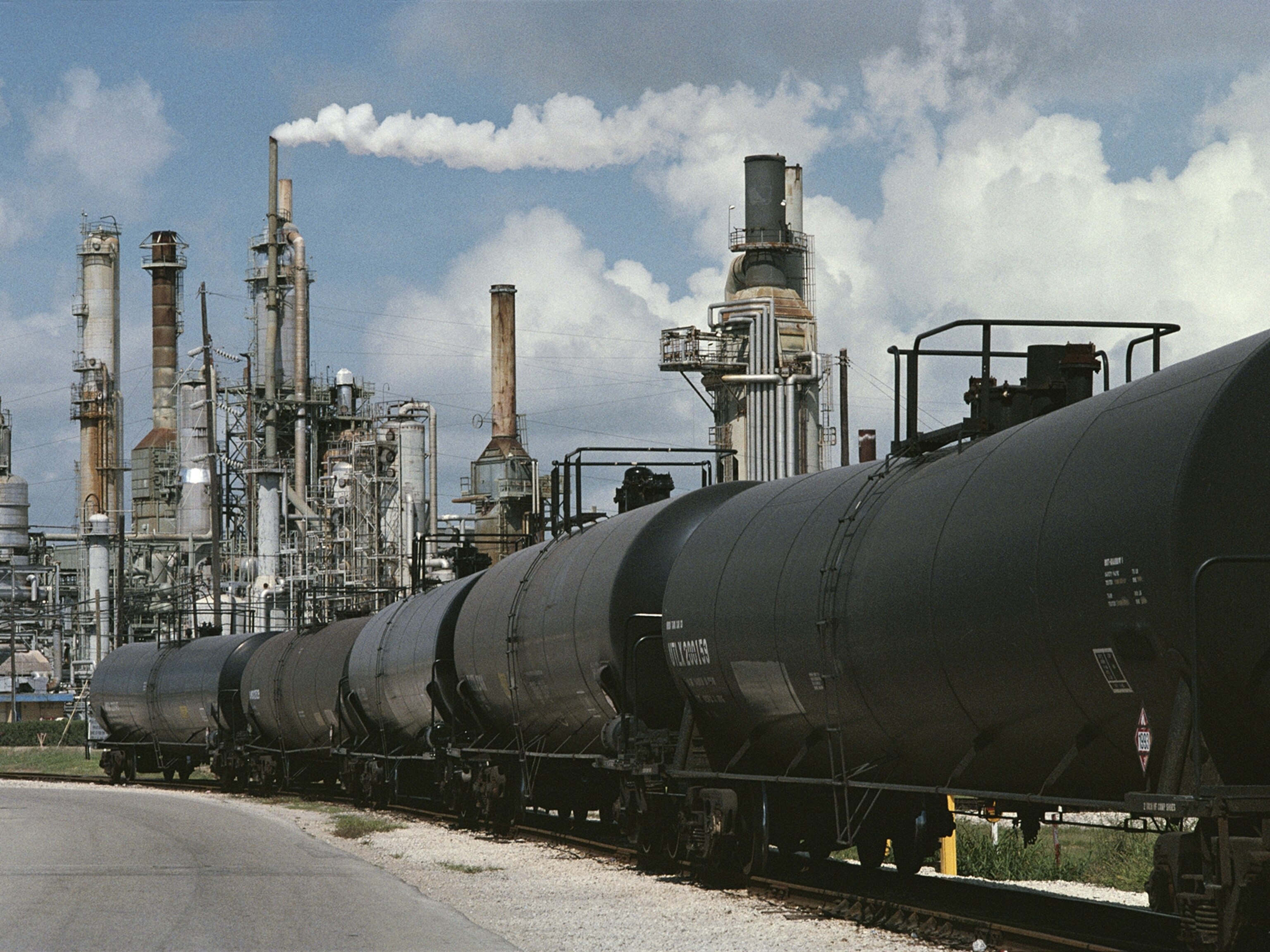
Amid U.S. Oil Bounty, a Growing Debate Over Exports
New report says lifting export restrictions would bring gasoline prices down.
With United States crude oil production at a 24-year high and set to climb further, a national debate has emerged: Should the U.S. export its oil for sale overseas?
The question would have been unthinkable just a few years ago, when U.S. oil production was in a seemingly inexorable decline. Now the country is in the midst of an oil and gas boom made possible by new drilling techniques, including the combination of fracking with horizontal drilling, leading many to question long-standing government restrictions on oil exports.
In the latest chapter of the debate, a report from global research firm IHS released at the end of May argues that lifting the export ban and sending U.S. oil out to wider markets will boost domestic crude production by almost 30 percent and inject nearly $750 billion of added energy investment into the economy.
The report also contradicts the conventional wisdom that gasoline prices would rise if the U.S. let go of some of its domestic supply. Instead, IHS projects, prices at the pump would actually drop by 8 cents per gallon.
Energy consultant Daniel Yergin, the IHS vice chairman who spearheaded the report, says current U.S. policy on oil exports is an "archaic remnant of a system that disappeared 33 years ago.
"It didn't matter that there was a ban on exports for maybe 30 of those years or so, because the U.S., it seemed, was just going to be importing more and more oil," Yergin said on a conference call about the report. "But in the last few years, it's clear that it does matter." The United States is now producing more barrels of oil per day than it imports, and the volume could eventually top the country's production peak of 1970.
Old Policy, New Debate
The "ban" on oil exports is not an absolute block, but rather a set of restrictions that date back to the fuel crisis touched off by the Arab oil embargo in 1973. Legislation passed in the wake of the embargo shut off most avenues for export, and for the most part, those restrictions remained in place even as other market controls were rolled back, as Yergin noted, in 1981.
Today, oil producers are allowed to obtain licenses to export to Canada, and they may export oil that comes from Alaska's Cook Inlet, among a few exceptions. But overall, less than 2 percent of the oil produced in the United States is sold outside its borders. Free-market proponents—not to mention oil companies and lawmakers from oil—producing states, such as Senators Lisa Murkowski of Alaska and Mary Landrieu of Louisiana-argue that the United States should allow that oil onto the world market, where it could command higher prices.
On the other side of the issue are U.S. refiners who benefit from discounted crude prices; lawmakers such as Senator Ed Markey of Massachusetts, who has argued that exports would hurt U.S. consumers by raising prices; and environmentalists who say that the boost in production would only deepen the current fossil fuel dependence and weaken the response to climate change.
The IHS report was funded by several oil producers, including Chevron and ExxonMobil, that have signaled their support for lifting the ban. "Obviously people who don't like the study will point to that," Yergin said in an interview with McClatchy. "This is our reputation, our work, and this is where our research led us." Yergin led a team of more than 40 people credited on the report.
Regardless of the report's provenance, IHS is not the only research organization calling for an end to the ban. Nonpartisan think tanks such as the Council on Foreign Relations and the Brookings Institution also have argued that the benefits of exporting U.S. oil would outweigh any potential downsides. And Energy Secretary Ernest Moniz has acknowledged that the export question is one among "lots of issues in the energy space that deserve some new analysis and examination in the context of what is now an energy world that is no longer like the 1970s."
Why Would Gas Prices Go Down?
If the United States started sending its crude to the world market, and domestic refiners no longer benefited from discounted crude, wouldn't gasoline prices go up? That's the argument of the ban's proponents, who say it protects American consumers from higher prices.
The ban unquestionably offers protections to refiners such as Valero and Tesoro. "In an environment where there are market restrictions on crude, and that crude price is artificially depressed, U.S. refiners come out ahead," said John Auers, executive vice president of Turner, Mason & Company, an engineering consulting firm that is studying the issue.
Part of the argument for lifting the ban involves a mismatch between the type of crude the United States is now producing and what refiners are outfitted to process. About 96 percent of the growth in domestic oil production is of the "light, sweet" (lower density, lower sulfur) variety. But in the past 25 years, Yergin said, U.S. refining capacity has been reconfigured to accommodate heavy crude from Mexico, Venezuela, and Canada.
Yergin and others who support exports say that, as the United States produces more of this light crude, the lack of capacity to refine it is holding down domestic oil prices and dampening investment in oil exploration.
Allowing producers new outlets for their oil wouldn't lead to a hike in gas prices, the IHS report concludes. Instead, it argues, adding U.S. oil to the larger market would boost supply and therefore lower global oil prices.
"Since U.S. gasoline is priced off global gasoline prices, not domestic crude prices, the reduction will flow back into lower prices at the pump," the report says.
Working Around the Ban
Senators Landrieu and Murkowski recently asked the Energy Information Administration (EIA) to expand its study of production and refining capacity for different grades of crude, saying that the export issue needs a "dynamic and ongoing analysis of the full picture."
The agency said in an analysis last month that "the question of how a relaxation in current limitations on crude exports might affect domestic and international markets . . . continues to hold great interest for policymakers, industry, and the public. In response to multiple requests, EIA is developing analyses that shed light on this question."
Despite the political maneuvering, few expect the prohibitions to be lifted anytime soon. "We don't know what the policymakers will do, but the consensus right now is that there will be no major change in policy," said Turner, Mason & Company's Auers. Yergin echoed this: "One would not expect in an electoral year that this would be at the top of the agenda."
In the meantime, the EIA and others have noted that oil producers have some options. One is to continue exporting oil to Canada—and, indeed, EIA data show that while overall exports of oil remain just a fraction of what is produced, they have risen nearly fourfold over the last five years and hit a 15-year high in April.
Another option is to take the lightest type of oil, known as condensate, and refine it into products, such as naphtha (used in making chemicals) and kerosene, that are not subject to export restrictions. Many companies, including Valero and Kinder Morgan, are doing just that—investing in "condensate splitters," or facilities that can economically spin off exportable products from condensate.
Auers noted that there is so much condensate, which often occurs as a byproduct of natural gas production, coming out of the Eagle Ford shale in Texas that "some level of condensate processing investment makes sense" whether the export ban remains in place or not. And for the time being, he said, investing in this simple refining process is a way for companies to profit from the current deluge of domestic oil.
Lifting the export ban on this one type of oil might be politically easier to achieve, and the IHS report says it "would be an important interim step." But condensate would be just one of multiple fossil fuel streams the United States is now in a position to direct overseas, including natural gas, another subject of export debate.
"Six years ago we were going to be an importer [of natural gas], and now it's turned around," Yergin said. "So I think these debates are indicative of the fact that we are in transition from one energy position to another as a country."
This story is part of a special series that explores energy issues. For more, visit The Great Energy Challenge.








